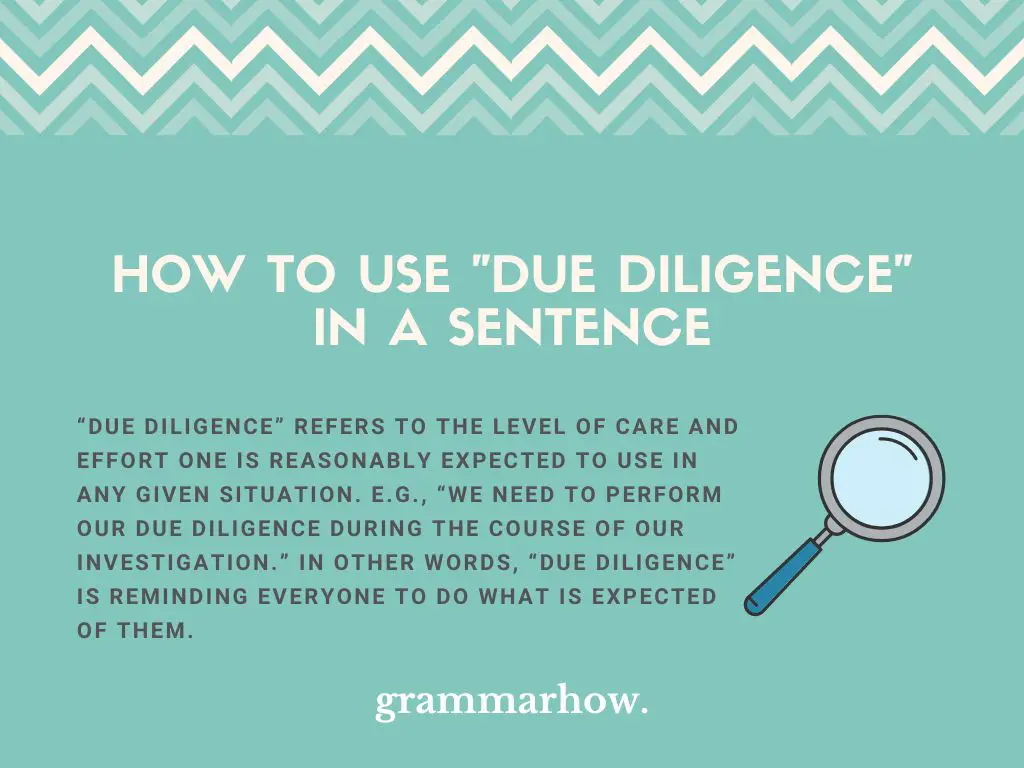You may have heard the phrase “due diligence” thrown around from time to time, but what does it actually mean, and how is it really supposed to be used in a sentence? In this post, we’ll cover both of these things, so you can use the phrase properly whenever you wish.
How to Use “Due Diligence” in a Sentence
“Due diligence” refers to the level of care and effort one is reasonably expected to use in any given situation. E.g., “we need to perform our due diligence during the course of our investigation.” In other words, “due diligence” is reminding everyone to do what is expected of them.

In fact, this is almost entirely how the phrase “due diligence” is used. If there was a crime, a police chief might remind his officers to conduct their “due diligence” while investigating it, which is a reminder that they should do everything that is reasonably expected of their job.
This is why the phrase gets used frequently in the business world, as it is often used by people in charge to remind everyone of their obligations and what is expected of them. Imagine that you’re a student who needs to write a book report. Your “due diligence” would be to read the book and write the report.
If you did not read the book and just tried to write the report based off of internet searches or things you made up, you would not be “doing your due diligence.” Simply put, doing what is expected of you and taking precautions in any given situation is “doing your due diligence.” Here are a few examples:
- Financial due diligence includes making a budget and keeping track of your expenses.
- As part of our due diligence as inspectors, we must examine every aspect of the vehicle.
- In the courtroom, the due diligence process requires a lawyer to make every possible effort to help their client.
What Does “Due Diligence” Mean?
Technically, “due diligence has a slightly more specific meaning in business. The Cambridge Dictionary is a little more specific on its definitions of “due diligence.” It defines the business definition as “the detailed examination of a company and its financial records, done before becoming involved in a business arrangement with it.”
That’s pretty specific. In fact, it’s almost too specific. Yes, it would be due diligence to carefully examine another company before entering into a business arrangement with it, but it would also be due diligence to keep careful track of one’s records and budget within their own company.
Really, full due diligence is just being cautious and safe. Going on a trip somewhere? Planning out an itinerary is due diligence. Crossing the street? Looking both ways first is due diligence. Conducting proper maintenance on your car to avoid breakdowns or accidents is due diligence.
At its core, “due diligence” just refers to the process of doing whatever you can and should to avoid a negative outcome. Some definitions might get more strict than that, but no one would fault you for using “due diligence” in this manner, in almost any context.
“Do Diligence” or “Due Diligence?”
The correct version of this phrase is “due diligence,” not “do diligence.” One cannot “do” diligence, however, diligence itself can be warranted, expected, or obliged; in other words, it can be due, making “due diligence” the proper way of saying this phrase.
Is “Do Due Diligence” Grammatically Correct?
Technically, yes, it is grammatically correct to say “do due diligence.” However, no one can deny that it sounds very weird and unnatural. While it wouldn’t be technically incorrect to say this, there are many better ways to say the same thing that would sound far more natural.
For instance, you could use a different word besides “do,” such as “perform” or “conduct.” You could also specify who the “due diligence” belongs to, and say “do my/your/our due diligence.” Either option would make the phrase sound far more natural than “do due diligence” even if that isn’t wrong.
Do You Perform or Conduct Due Diligence?
When used as verbs, “perform” and “conduct” are synonyms of one another. They both mean “do” or “carry out.” This means you could use either one when referring to due diligence and they would be equally correct. There is nothing wrong with either choice.
Final Thoughts
“Due diligence” is the level of care or effort an individual should put in to avoid a negative outcome. For example, “our due diligence requires us to examine every aspect of the crime scene so we may catch the culprit.”

Martin holds a Master’s degree in Finance and International Business. He has six years of experience in professional communication with clients, executives, and colleagues. Furthermore, he has teaching experience from Aarhus University. Martin has been featured as an expert in communication and teaching on Forbes and Shopify. Read more about Martin here.

